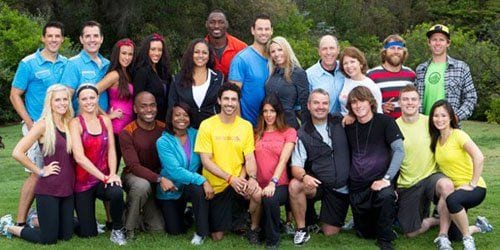
Rushing into its 19th (!) season like so many of its frantic contestants, The Amazing Race can surely be described as venerable at this point. Not merely surviving but thriving alongside fellow tenacious franchises from reality TV’s turn-of-millennium first wave like Survivor, the much-loved globe-trekking competition has benefitted not only from an endlessly reproducible formula, but also from CBS’ old-school fondness for endlessly reproducible formula television.
Of course, the main strength of Elise Doganieri and Bertram van Munster’s small-screen juggernaut continues to be its casting. Unlike the unending litany of empty-skulled young adult peacocks who populate sex-soaked programs like The Bachelor, The Amazing Race offers an entertaining mix of endearing dorks, strutting photogenic jokers, gossipy cats with claws drawn, and the occasional plain old nasty piece of work. The pretty young things crop up in multiple pairs every season, to be sure, and the minor-celebrity stunt casting has become more prevalent in recent iterations. But the variety of personalities and team interactions leads to a real democratic choice of rooting interest for viewers, a choice maximized by the relative dearth of opportunities for engaging in cutthroat tactics (U-Turns very much excepted).
The choice of contestants in this running of the Race (evidently subtitled “The World is Waiting,” if the slogan on the bus transporting the contestants is any indication) bears out this conclusion. Catching the casual pop culturalist eye right off the top are two million-dollar Survivor champs (curly-mopped Ethan Zohn and his girlfriend Jenna Morasca), former Olympic snowboarders (Andy Finch and Tommy Czeschin), and former Indianapolis Colts tight end Marcus Pollard, joined by his wife Amani. In addition to the gimmick casting, there appears to be at least one bad temper in the mix (belonging to Jennifer Young, whose milder brother Justin seems primed to be a target for her simmering ire), in addition to a driven control freak (Cindy Chiang, pulling along her vanilla fiancé Ernie Halvorsen).
But as the premiere episode of this season (entitled “Kindness of Strangers” for reasons I shan’t divulge) bore out, The Amazing Race is at its best when it anticipates our assumptions about other people, overturns them, and then invites all new judgments. Introducing themselves at the top of the show, the pair of Vegas showgirls (Kaylani Paliotta and Lisa Tilley) emphasized that they looked forward to confounding the dim bubblehead stereotypes that plague their profession. So, of course, Kaylani had to misplace her all-important passport before they even got out of the States, likely the first of the usual series of hilarious blunders by at least half the teams in the competition. But there’s always space for redemption in this world, and the showgirls later aced a Roadblock that frustrated the blond twins (Liz and Marie Canavan), even as the supposedly sharp retired teachers (Bill and Cathi Alden) wandered the streets of Taipei for hours, looking for a simple clue that would direct them to the same challenge.
This Roadblock, a telephone game involving the memorization and repetition of a Confucian proverb, was a reminder that beyond the obvious set of emotional and sexual appeals inherent to the show, The Amazing Race has a cultural savvy and undercurrent of intelligence that wins it fans from all levels of the socio-economic and educational spectrum. This is the show that, a few seasons back, bade its contestants to assemble and move golems through the Jewish quarter of Prague before loosing them on a bizarre Kafka-themed challenge of ringing phones on uniform desks in a darkened warehouse. It’s rarely quite that quasi-intellectual, of course, but such brainy elements grant it a certain cred amongst the dumb glut of major-network reality programming.
But The Amazing Race is not about literary references any more than it is about physical superiority or cultural sensitivity or host Phil Keoghan’s migrating accent (all the dialect coaching in the world can’t fully expunge the occasional Kiwi vowel from his utterances). It is, as it has always been, about the drive to succeed over the competition, about exercising the will to win, and the way that such single-minded pursuit of a goal (in this case, a heavily-taxed game show cash prize) can lay human relationships to waste as equally as it can galvanize them.
In this way, the show is a parable of American capitalism. It is also certainly a hyperactive burlesque of the bourgeois view of travel as a conduit for enlightenment and secular-spiritual fulfillment. The rivals chasing a million dollars across the globe see so much, but seem to experience and savor so little; is this frenzied hypertourism serving as a commentary on the commodification of the travel experience, or is it simply a side effect of providing repeatable television delights? As the surely-doomed Bill and Cathi mused on the rewards of the racing experience over a heart-tugging musical cue (as only the inevitable eliminated losers do) near the premiere’s conclusion, we were left to wonder: does it matter more to enjoy the journey and come out of it as a better person, or to be the first team to the mat? Whatever the answer is for the competitors of The Amazing Race, the audience watching at home has chosen to enjoy the ride, again and again.

![Call for Papers: All Things Reconsidered [MUSIC] May-August 2024](https://www.popmatters.com/wp-content/uploads/2024/04/all-things-reconsidered-call-music-may-2024-720x380.jpg)



